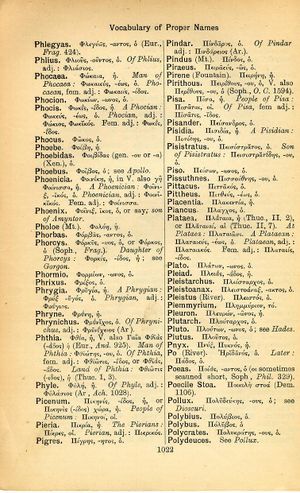Phormio
ὁκόσα γὰρ ὑπὰρ ἐκτρέπονται ὁποίου ὦν κακοῦ, τάδε ἐνύπνιον ὁρέουσι ὥρμησε → for whatever, when awake, they have an aversion to, as being an evil, rushes upon their visions in sleep (Aretaeus, Causes & Symptoms of Chronic Disease 1.5.6)
English > Greek (Woodhouse)
Φορμίων, -ωνος, ὁ.
Latin > English (Lewis & Short)
Phormĭo: ōnis, m.
I The name of a parasite in Terence, in a play of the same name.—
II A Peripatetic philosopher of Ephesus, who delivered a lecture in the presence of Hannibal on the duties of military commanders and on the art of war, Cic. de Or. 2, 18, 75; hence, transf., of a silly person, who talks about things which he does not understand: egomet in multos jam Phormiones incidi, id. ib. 2, 19, 77.—
III A Roman surname: Sextus Clodius Phormio, Cic. Caecin. 10, 27; id. Phil. 2, 6, 15.
Latin > French (Gaffiot 2016)
(2) Phormĭō, ōnis, m.,
1 Phormion [général athénien dans la guerre du Péloponnèse] : Gell. 17, 21, 23
2 philosophe péripatéticien du temps d’Hannibal : Cic. de Or. 2, 75
3 titre d’une comédie de Térence.
Latin > German (Georges)
(1) Phormio1, ōnis, m., I) Name eines Schmarotzers in dem gleichnamigen Stücke des Terenz. – II) ein peripatet. Philosoph zu Ephesus, der sich vor Hannibal in einem schulmäßigen Vortrage über Kriegskunst hören lassen wollte, Cic. de or. 2, 75; dah. appellat. Phormiones von Leuten, die über Dinge reden, von denen sie nichts verstehen, Cic. de or. 2, 77.

